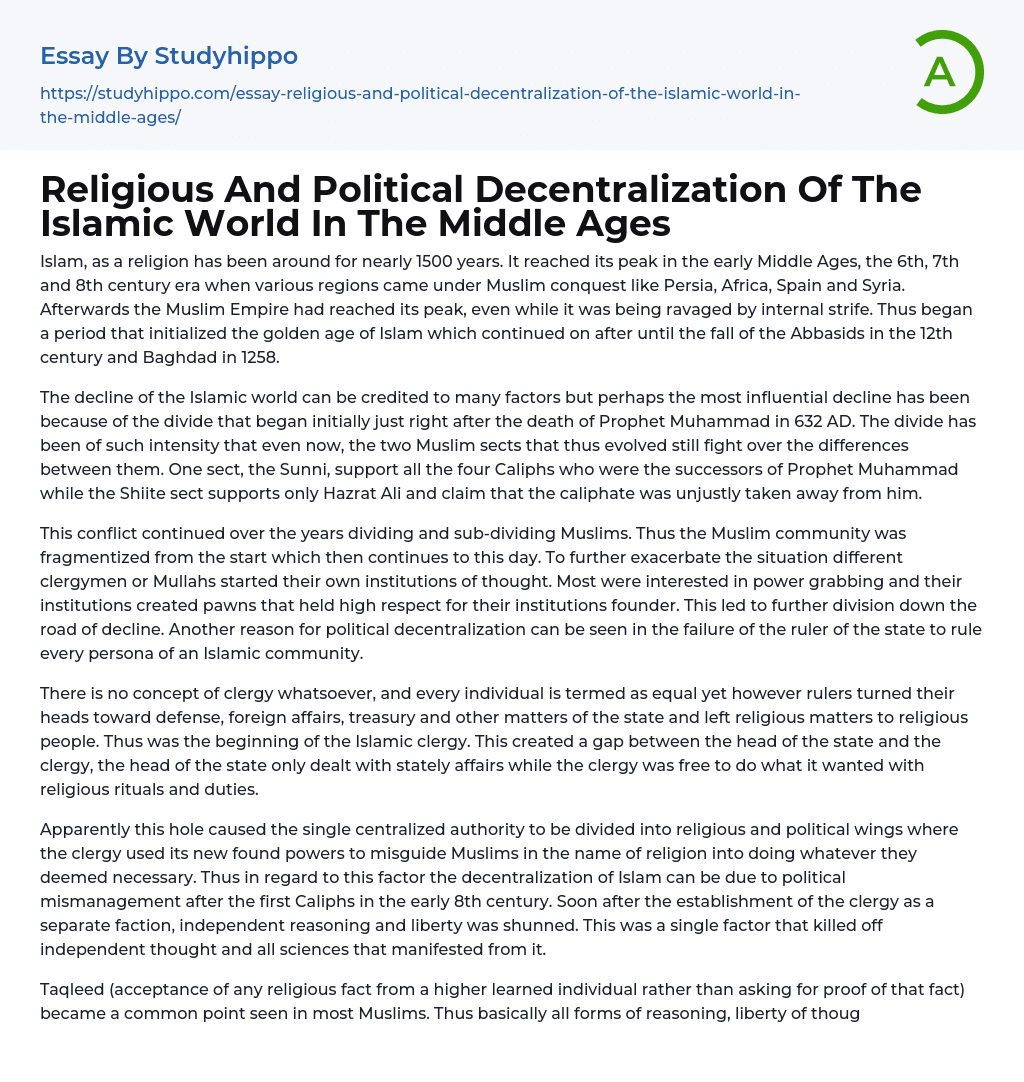

Religious And Political Decentralization Of The Islamic World In The Middle Ages Essay Example
Islam, as a religion has been around for nearly 1500 years. It reached its peak in the early Middle Ages, the 6th, 7th and 8th century era when various regions came under Muslim conquest like Persia, Africa, Spain and Syria. Afterwards the Muslim Empire had reached its peak, even while it was being ravaged by internal strife. Thus began a period that initialized the golden age of Islam which continued on after until the fall of the Abbasids in the 12th century and Baghdad in 1258.
The decline of the Islamic world can be credited to many factors but perhaps the most influential decline has been because of the divide that began initially just right after the death of Prophet Muhammad in 632 AD. The divide has been of such intensity that even now, the two Muslim sects that thus evolved still fight over the differences betw
...een them. One sect, the Sunni, support all the four Caliphs who were the successors of Prophet Muhammad while the Shiite sect supports only Hazrat Ali and claim that the caliphate was unjustly taken away from him.
This conflict continued over the years dividing and sub-dividing Muslims. Thus the Muslim community was fragmentized from the start which then continues to this day. To further exacerbate the situation different clergymen or Mullahs started their own institutions of thought. Most were interested in power grabbing and their institutions created pawns that held high respect for their institutions founder. This led to further division down the road of decline. Another reason for political decentralization can be seen in the failure of the ruler of the state to rule every persona of an Islamic community.
Ther
is no concept of clergy whatsoever, and every individual is termed as equal yet however rulers turned their heads toward defense, foreign affairs, treasury and other matters of the state and left religious matters to religious people. Thus was the beginning of the Islamic clergy. This created a gap between the head of the state and the clergy, the head of the state only dealt with stately affairs while the clergy was free to do what it wanted with religious rituals and duties.
Apparently this hole caused the single centralized authority to be divided into religious and political wings where the clergy used its new found powers to misguide Muslims in the name of religion into doing whatever they deemed necessary. Thus in regard to this factor the decentralization of Islam can be due to political mismanagement after the first Caliphs in the early 8th century. Soon after the establishment of the clergy as a separate faction, independent reasoning and liberty was shunned. This was a single factor that killed off independent thought and all sciences that manifested from it.
Taqleed (acceptance of any religious fact from a higher learned individual rather than asking for proof of that fact) became a common point seen in most Muslims. Thus basically all forms of reasoning, liberty of thought and questioning were seen as blasphemy in the eyes of the Islamic clergy. Tolerance for different ideas faded and philosophical thought was abandoned. Furthermore the attack of Mongols devastated universities, libraries and hospitals never to be made again. Thus the Muslim world was plunged into illiteracy never to be prompted again to rise above all others due to fragmentation, mismanagement and
abolishment of free thought.
- Quran essays
- Al-Qaeda essays
- Muhammad essays
- Muslim essays
- Ali essays
- Ramadan essays
- Saudi Arabia essays
- Egypt essays
- Iran essays
- Iraq essays
- Israel essays
- Syria essays
- Appeal essays
- Revenge essays
- Corporate Governance essays
- Public Service essays
- Income Tax essays
- Supply essays
- Red Cross essays
- Democracy essays
- State essays
- Liberty essays
- Absolutism essays
- Reform essays
- Republic essays
- John Marshall essays
- Bourgeoisie essays
- Developed Country essays
- Elections essays
- International Relations essays
- Left-Wing Politics essays
- Monarchy essays
- Political Corruption essays
- Political Party essays
- Political Science essays
- Sovereign State essays
- United Nations essays
- World Trade Organization essays
- Contras essays
- Dictatorship essays
- Foreign policy essays
- Monarch essays
- Corruption essays
- Foreign essays
- Democratic Party essays
- European Union essays
- President Of The United States essays
- John Stuart Mill essays
- Terrorism essays
- Military essays



